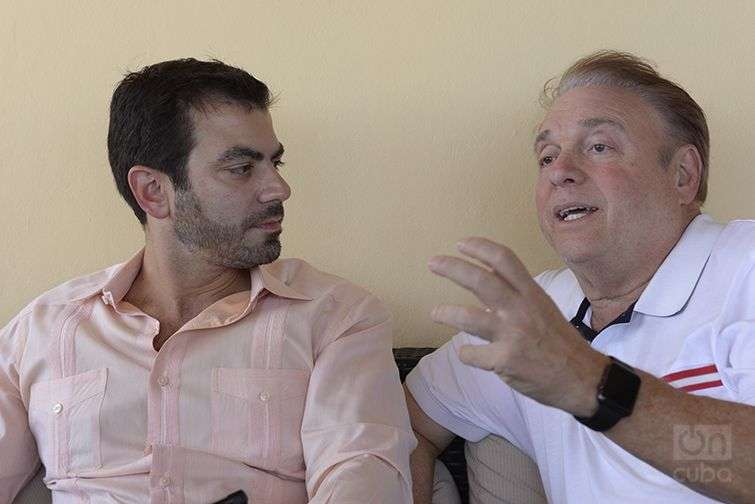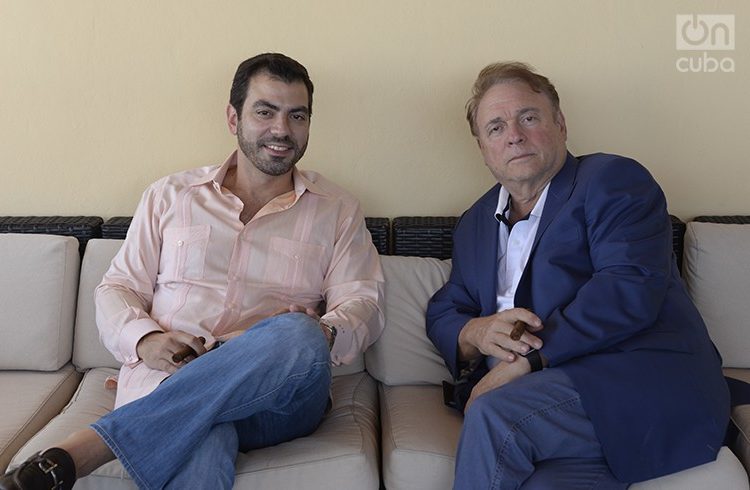Freddy Balsera and Stephen Zack belong to different generations, and their life experiences have been completely different, but for a long time they have shared a common goal: bringing about a change in relations between the United States and Cuba.
They travelled to Havana to attend the opening ceremony of the American Embassy in Cuba, as a way to show their support for this new path taken by the Obama Administration.
Balsera helped to design President Barack Obama’s national Latino television and radio campaign, and will also be working in Hillary Clinton’s campaign in Florida. Zack was the first person of Latino descent to be President of the American Bar Association, and is currently one of the partners at Boies, Schiller & Flexner law firm.
“I can’t believe this is happening,” said Balsera. “Last week I told someone ‘I´ll see you in Havana!’ I never thought I’d be able to say something like that someday.”
“That the embargo has failed is no secret for anyone,” he added. “Cuban exiles have acknowledged that it hasn’t brought about the change they expected. The disagreement now is between those who want to find new options and have the courage to speak about it openly, and those who for other reasons, whether emotional or of any other kind, think that the policy of coercion should continue.”
“President Obama named me representative to the United Nations last year,” said Zeck, “a post in which I had the opportunity to witness the scant support the embargo enjoys. Only three countries were in favour of it: the U.S., Israel and Palau. The international impact of our policy towards Cuba was also a reason for change.”
Balsera, a second generation Cuban, was born in the United States. Zack on the other hand, American by birth, was taken to Cuba when he was only two months old. He lived in a mansion in Miramar that had belonged to his grandfather, a rich Jewish man who had left the country after his properties were expropriated in 1961 by the Revolutionary government.
“Your whole life you hear the stories of this mythical place called Cuba,” said Balsera. “They show you pictures, they tell you how it was, but it wasn’t possible to visit. Unlike my American friends, visiting the town where my parents were raised was not a possibility for me. It was something I could not do until 2002, when I travelled to Cuba for the first time.”
Zack returned to Cuba in 2008 for the first time; then he came back last June to take part in a meeting with lawyers and judges in Cuba.

“Obama’s policy towards Cuba is reversible”, opines Balsera when asked about the future of this succession of surprising events. “A lot will be at stake in the next elections, and there’s great risk that everything that Obama is doing falls into a standstill or is reversed if a Republican wins the elections.”
“I don’t agree with that completely,” said Zack. “If you pay attention to the debates, what the Republicans are saying is that they would change Obama’s policy towards Iran, or that they would change Obamacare. With the exception of Marco Rubio (who is not going to be president), the rest of the candidates have said nothing about changing Obama’s policy to Cuba. I don’t think they will because the Latino vote is gaining more and more importance.”
“Stephen’s approach here is very practical,” replied Balsera, “but if we analyse this in more detail, an interesting fact emerges. All the candidates have to win the presidential primary elections first. Florida is a state of utmost importance to win the Republican primary, and as we get closer to it, the candidates will start voicing their opinions on Cuba.”
“If we look at the block of Cuban-American Republican voters,” he continued, “the group that has shown the strongest rejection of the new policy, we realize that it is not possible to win without them. Therefore, the rhetoric of all the Republican candidates is going to be extremely aggressive against Cuba. What is going to happen is that the candidates who are to succeed will have to seek the support of Cuban-Americans in Congress. And what they are going to be asking in return is that they reverse everything Obama has done.”
In Balsera’s opinion, hope lies on the new waves of Cuban immigrants who have registered to vote. “There are different groups: the historic exiles from the 1960s, the émigrés who arrived from Mariel, the rafters from the 1990s, and those who have won the U.S. lottery (for visas), as well as newly arrived rafters. Their experiences vary a great deal from one group to the other. My wife, for instance, who was born and raised in Cuba, has a lot of family here, while me, on the contrary, have none.”
As for the future of Cuba, Zack thinks things are complicated. “I don’t think things will change overnight,” he said.
“It’d be arrogant of me as a foreigner to tell Cubans what’s going to happen here,” said Balsera. “I’m here to visit the land where my parents were born, and to show my solidarity to the Cuban people, taking part in this historic moment, because I believe that the best for Cuba and the best for the United States is a rapprochement between the two peoples. That will create the conditions for the people of Cuba to attain everything they ever wanted.”










Balsera is right… hope lies in the Cuban immigrant (lets hope they are all registered to vote) and don’t forget about the hundreds of US citizens who have visited Cuba over the past few years who also believe it is time for a policy change between our countries.